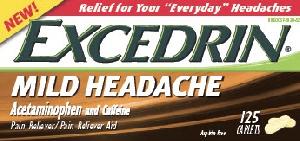Excedrin Mild Headache Interactions
There are 250 drugs known to interact with Excedrin Mild Headache (acetaminophen/caffeine), along with 12 disease interactions, and 6 alcohol/food interactions. Of the total drug interactions, 13 are major, 191 are moderate, and 46 are minor.
- View all 250 medications that may interact with Excedrin Mild Headache
- View Excedrin Mild Headache alcohol/food interactions (6)
- View Excedrin Mild Headache disease interactions (12)
Most frequently checked interactions
View interaction reports for Excedrin Mild Headache (acetaminophen / caffeine) and the medicines listed below.
- acetaminophen / butalbital / caffeine
- acyclovir
- alprazolam
- amlodipine
- aspirin
- Aspirin Low Strength (aspirin)
- bisacodyl
- bupropion
- cephalexin
- colchicine
- cyclobenzaprine
- dextromethorphan
- elderberry
- Excedrin Back & Body (acetaminophen / aspirin)
- Excedrin Migraine (acetaminophen / aspirin / caffeine)
- ginger
- green tea
- guaifenesin
- hydrocodone
- ibuprofen
- Imitrex (sumatriptan)
- Imodium (loperamide)
- Inderal (propranolol)
- Keflex (cephalexin)
- lisinopril
- loratadine
- losartan
- Maxalt (rizatriptan)
- Norco (acetaminophen / hydrocodone)
- venlafaxine
Excedrin Mild Headache alcohol/food interactions
There are 6 alcohol/food interactions with Excedrin Mild Headache (acetaminophen / caffeine).
Excedrin Mild Headache disease interactions
There are 12 disease interactions with Excedrin Mild Headache (acetaminophen / caffeine) which include:
- alcoholism
- liver disease
- cardiac disease
- hypertension
- psychiatric disorders
- PUD
- PKU
- cardiotoxicity
- liver disease
- renal dysfunction
- seizure disorders
- GERD
More about Excedrin Mild Headache (acetaminophen / caffeine)
- Excedrin Mild Headache consumer information
- Compare alternatives
- Drug images
- Side effects
- Dosage information
- During pregnancy
- En español
Related treatment guides
Drug Interaction Classification
| Highly clinically significant. Avoid combinations; the risk of the interaction outweighs the benefit. | |
| Moderately clinically significant. Usually avoid combinations; use it only under special circumstances. | |
| Minimally clinically significant. Minimize risk; assess risk and consider an alternative drug, take steps to circumvent the interaction risk and/or institute a monitoring plan. | |
| No interaction information available. |
See also:
Further information
Always consult your healthcare provider to ensure the information displayed on this page applies to your personal circumstances.


